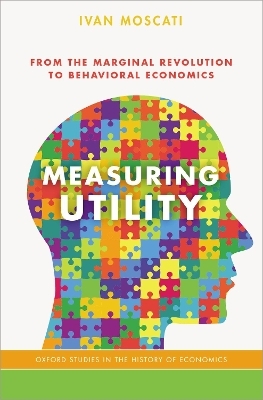
Measuring Utility
Oxford University Press Inc (Verlag)
978-0-19-937276-8 (ISBN)
Utility is a key concept in the economics of individual decision-making. However, utility is not measurable in a straightforward way. As a result, from the very beginning there has been debates about the meaning of utility as well as how to measure it. This book is an innovative investigation of how these arguments changed over time.
Measuring Utility reconstructs economists' ideas and discussions about utility measurement from 1870 to 1985, as well as their attempts to measure utility empirically. The book brings into focus the interplay between the evolution of utility analysis, economists' ideas about utility measurement, and their conception of what measurement in general means. It also explores the relationships between the history of utility measurement in economics, the history of the measurement of sensations in psychology, and the history of measurement theory in general. Finally, the book discusses some methodological problems related to utility measurement, such as the epistemological status of the utility concept and its measures.
The first part covers the period 1870-1910, and discusses the issue of utility measurement in the theories of Jevons, Menger, Walras and other early utility theorists. Part II deals with the emergence of the notions of ordinal and cardinal utility during the period 1900-1945, and discusses two early attempts to give an empirical content to the notion of utility. Part III focuses on the 1945-1955 debate on utility measurement that was originated by von Neumann and Morgenstern's expected utility theory (EUT). Part IV reconstructs the experimental attempts to measure the utility of money between 1950 and 1985 within the framework provided by EUT.
This historical and epistemological overview provides keen insights into current debates about rational choice theory and behavioral economics in the theory of individual decision-making and the philosophy of economics.
Ivan Moscati is Associate Professor of Economics at the University of Insubria, Varese, and teaches History of Economics at Bocconi University, Milan. His articles have been published in a range of journals in economics, history of economic thought, and economic methodology, and one of them was awarded the Best Article Award of the History of Economics Society.
Introduction
PART I: Utility Measurement in Early Utility Theories, 1870-1910
1. When Unit-Based Measurement Ruled the World: An Interdisciplinary Overview, 1870-1910
2. Is There a Unit of Utility? : Jevons, Menger, and Walras on the Measurability of Utility, 1870-1910
3. Still on the Quest for a Unit: Utility Measurement in Wieser, Böhm-Bawerk, Edgeworth, Fisher, and Marshall, 1880-1910
PART II: Ordinal and Cardinal Utility, and Early Empirical Measurements of Utility, 1900-1945
4. Fundamental Measurement, Sensation Differences, and the British Controversy on Psychological Measurement, 1910-1940
5. Ordinal Utility: Pareto and the Austrians, 1900-1915
6. Cardinal Utility: How It Entered Economic Analysis from Pareto to Samuelson, 1915-1945
7. Going Empirical: The Econometric and Experimental Approaches to Utility Measurement of Frisch and Thurstone, 1925-1945
PART III: From Debating Expected Utility Theory to Re-Defining Utility Measurement, 1945-1955
8. Stevens and the Operational Definition of Measurement in Psychology, 1935-1950
9. The Expected Utility Theory and Measurement Theory of von Neumann and Morgenstern, 1944-1947
10. What Is That Function?: Friedman, Savage, Marschak, Samuelson, and Baumol on EUT, 1947-1950
11. From Chicago to Paris: The Debate Continues, 1950-1952
12. Conventions, Operations, Predictions: Re-Defining Utility Measurement, 1952-1955
PART IV: Expected Utility Theory and Experimental Utility Measurement, 1950-1985
13. Experimental Utility Measurement: The Age of Confidence I, 1950-1960
14. Marschak and Utility Measurement at Yale: The Age of Confidence II, 1960-1965
15. From Utility Measurement to the Representational Theory of Measurement: The Case of Suppes, 1950-1970
16. Measuring Utility, Destabilizing EUT: Behavioral Economics Begins, 1965-1985
Epilogue
Acknowledgments
References
Index
| Erscheinungsdatum | 23.11.2018 |
|---|---|
| Reihe/Serie | Oxford Studies in History of Economics |
| Verlagsort | New York |
| Sprache | englisch |
| Maße | 239 x 160 mm |
| Gewicht | 692 g |
| Themenwelt | Geschichte ► Teilgebiete der Geschichte ► Wirtschaftsgeschichte |
| Wirtschaft ► Allgemeines / Lexika | |
| Wirtschaft ► Volkswirtschaftslehre ► Mikroökonomie | |
| ISBN-10 | 0-19-937276-4 / 0199372764 |
| ISBN-13 | 978-0-19-937276-8 / 9780199372768 |
| Zustand | Neuware |
| Informationen gemäß Produktsicherheitsverordnung (GPSR) | |
| Haben Sie eine Frage zum Produkt? |
aus dem Bereich


